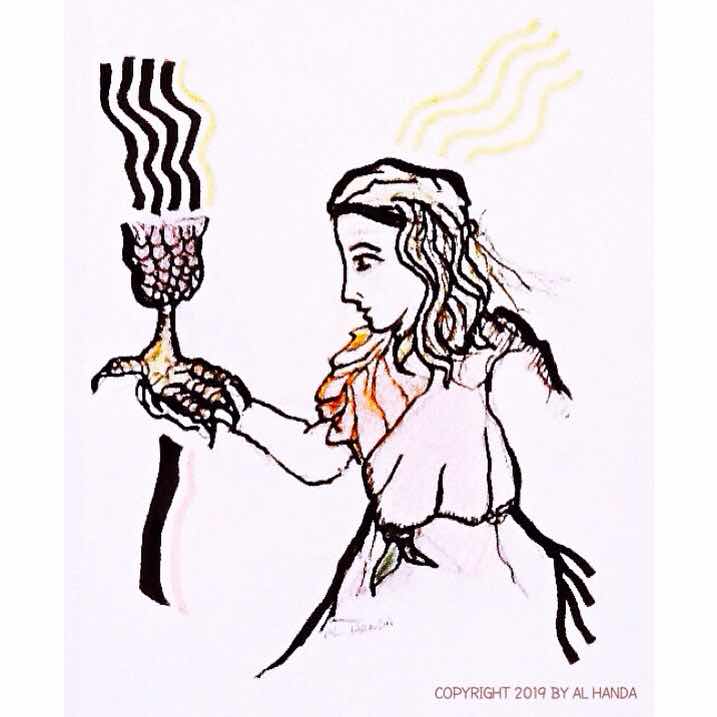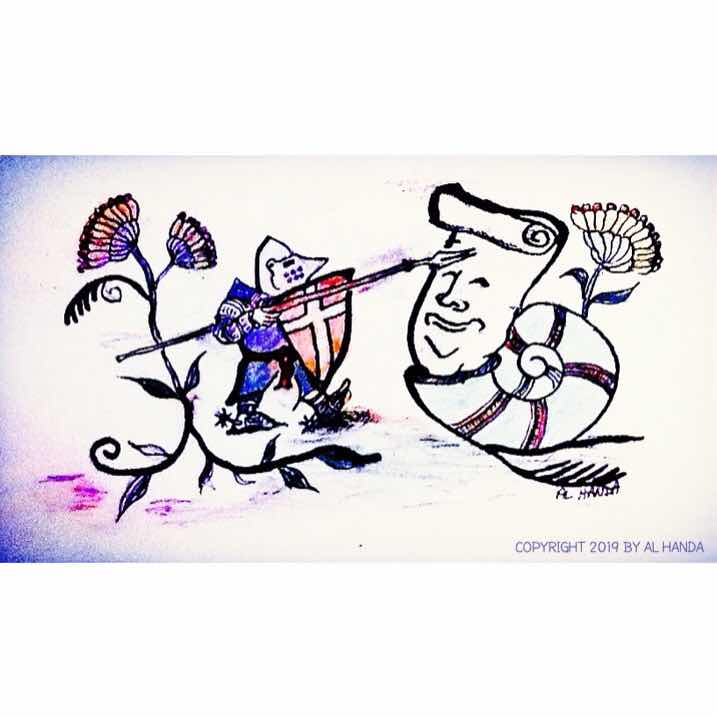"Think for yourselves and let others enjoy the privilege to do so, too..."
-George Orwell




Each generation produces a coterie of rebels and forward thinkers who may or may not edge our culture forward, but will at least add ideas to the mainstream. Very few age groups develop an ability to look inward and see their own flaws in real time. That tends to be the task of the next generation.
There were writers such as Voltaire, H. L. Mencken, Paul Krassner, or Tom Wolfe who could see that human nature was really a constant, that is to say, could see the irony in a generation criticizing another, and who turned their sharp eye on their peers' foibles and failings.
But most societal critics and lampooners end up becoming, as George Orwell called it, "licensed jesters" who can coast along as honored sages if they stick to approved targets, but the early feminist writers, the ones who stubbornly kept to the core issue of equality, broke that mold, as as a result faced often bitter resistance from those who made male superiority into a dogma requiring as much faith as the belief that all of us could spring from Noah's Ark without becoming severely inbred.
It can be said that it's easier to take a political stance than a social one, as the Constitution protects political speech. Social mores are enforced by attitudes and acts that can easily crush an individual or force conformity without legal repercussions.
It was an easier matter to protest the Vietnam War in the 60s than it was to point out that even "counterculture" movies perpetuated the traditional role of women that had existed in previous generations. A couple could go to a anti-war rally and go home pretty much feeling the same about relationships but a woman burning her bra at a rally could find herself at odds with a male at home who was determined to show who was still the boss, and even face criticism from other women.
...an exception...
Feminism was a notable exception to the usual generational conflict in that the writers questioned or attacked the current social contract that assumed that women were adjuncts to the male world, which exposed them to resistance and attacks by peers who saw the greater struggles on male terms. They didn't just criticize the Ozzy and Harriet myth of the past, but noted how it was alive and well in hipper scenes.
A woman who wrote about feminism not only had to challenge centuries of ingrained cultural beliefs about the sexes, but generally had to do so without the support of male peers and even other women who still bought into the idea of males leading the way.
The sheer mass of attitudes, cultural norms and laws must have been daunting, particularly on the social, or personal level, that is to say, the liberation of the self. The criticisms and attacks on feminism, which often could be cruel, must have severely tested the will of a woman who broke from the mold. It was a path that in the early stages, many had to walk alone while weathering the usual adolescent male attacks on physical appearance, sexual preference, desirability, mental state, rape fantasies, and speculation on what uppity females really need.
Feminists made acute observations about traditional sexual attitudes, that to males could often be about control and even punishment. It was a common retort that a rebellious woman just needed a good shagging, that is to say, putting her under a male restored the hierarchy. Which is a man-made dogma. It's really nothing of the sort in actual biological terms. In nature, the sex act proves nothing about dominance or hierarchy between the sexes.
...the shoe on the other foot...
Empathizing with feminism only requires that men look within themselves to realize that a woman's experience isn't an abstract or something that doesn't affect them. In fact, most men are also marginalized by the myth of male superiority. After women are put into their place, men quickly go to work making some of their own more equal than others. Like an army of peasants who take up the sword and fight for their king, and after the battle realize that things didn't change for them afterwards. Most men would benefit from a change in the social order.
The basic concept of feminism, that of equality, still hasn't been achieved, but the common sense behind it has gradually been recognized. Laws regarding discrimination, alimony, child support, and other issues were passed by legislatures dominated by males, who heard the arguments and saw those measures as fair play.
...the age of dinosaurs...
Hanging out in used book stores and spending hours browsing books was an extension of my childhood. One of my earliest first grade memories was sneaking into the upper grade school library and studying this book about dinosaurs. It wasn't the pictures of fabulous and terrible monsters that drew me in, it was that the illustrator had skillfully created a world that one could imagine being in, and moving about in that landscape was so much more exciting than a schoolyard.
As we get older, we learn that society is really a chaotic collision of many points of view. Children, for example, see the prehistoric world with a sense of wonder. As adults, it's described as a world with apex predators at the top of an hierarchy that simulates order.
The assumption that the biggest predators run things merely validates the idea that the hierarchy of life is based on force. Which true when it is and not when it's not. More than a few so called apex predators don't make the cut and starve to death due to incompetence or injury, or are forced to turn on their own. The inevitability of individual strength is really a human notion.
Yes, a bigger amount of force can beat a lesser amount, but not because one life form has more teeth than another. The idea that size matters is a belief espoused mainly by those who benefit from it, and to make sure that the smaller beings don't get the heretical idea that a group can bring down an individual.
...bullies...
Young males in my childhood were taught to stand up for oneself against bullies and such, and that such resistance built character even if a fight was lost. The most popular image was of the single bully being successfully taught a lesson by a brave lad, and that sometimes happened. Sort of the David and Goliath thing.
The reality was that the single combat trip simply reinforces the power mentality, as most bullies actually lead packs and quickly overpower any individual. Which is why anti-bullying campaigns can have such an uphill struggle. There's the image of the lone bully, but a lot of others are complicit, whether joining in on the act, cheering it on, or holding back in fear. Bullying is a larger, more nuanced mentality that often involves groups.
Bullying is often about enforcing social conformity or pecking orders by force, and tends to target the weak, isolated, or the simply different. There certainly are a variety of psychologies in play, but the lone bully stereotype is simply the most common and not definitive. Many "bullies" are really the leader or outward manifestation of a group think or leveling mentality.
In other words, out there in the wild, I would see the tough macho types, like in the movies, but realized that those types weren't in charge or dominant. They became the ones to avoid, who always attracted trouble and were in many cases almost helpless.
...childhood's end...
In my book, I mirror a childhood scene with that dinosaur book, except it's the street activity centered around a motel in Northern California. The chapter describes a world that was different from the colorful pictures of tyrannosaurs walking about in charge with everything else making way.
Kicking the T-Rex's butt to make things safer for everyone was the old school way of thinking, but in the real world, the scary stuff was in the shadows, and all around us, and within.
It will be seen that what the defenders of Dali are claiming is a kind of BENEFIT OF CLERGY. The artist is to be exempt from the moral laws that are binding on ordinary people."
- George Orwell (Benefit Of Clergy: Some Notes On Salvadore Dali 1944)
The concept of benefit of clergy is a theme that runs through the book (with a lmost 30 chapters, there's plenty of room for themes) along with an examination of the various forms of power. I construct the scenes as a reality, which isn't the same thing as a truth. Most people who tell others to face reality are really talking about how they see the world.
In one chapter, there's a seemingly "respectable" man who manipulates and uses a young homeless woman. On one hand, there's the upstanding and moral man, who probably asserts respect for women in public, but viewing the young woman as a slut or prey allows him to put her into a different compartment, so to speak, so he can step outside his box and be a predator.
How the guy gave himself permission to become a sleaze bag is important, and had to be described. The literary device I used was to pan out instead of in, like the Japanese author Tanizaki did in his book, The Secret History Of The Lord Of Musashi, which focused on the seemingly irrelevant and weird details of the affair, which should, in my mind, turn what might have come off as a morality play scene into a vivid fractal-like world.
In other words, the everyday world the man lived in and controlled was the real clue to why he exploited the young homeless woman. It wasn't a fall from grace, or "bad judgement" but a darker reflection of how people have always handled power, or in this case, a male prerogative.
- Al Handa
-Al Handa
Thoughtful, empathetic, cerebral essay.
ReplyDeleteThank you, very kind of you to say that.
ReplyDeleteThank you for the nice comment, very appreciated.
ReplyDeleteReally good!
ReplyDelete